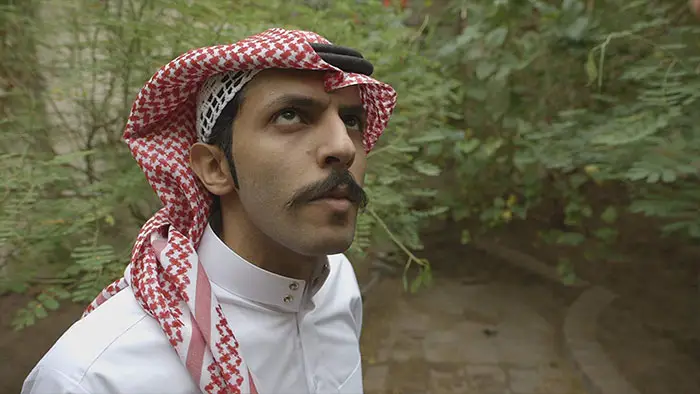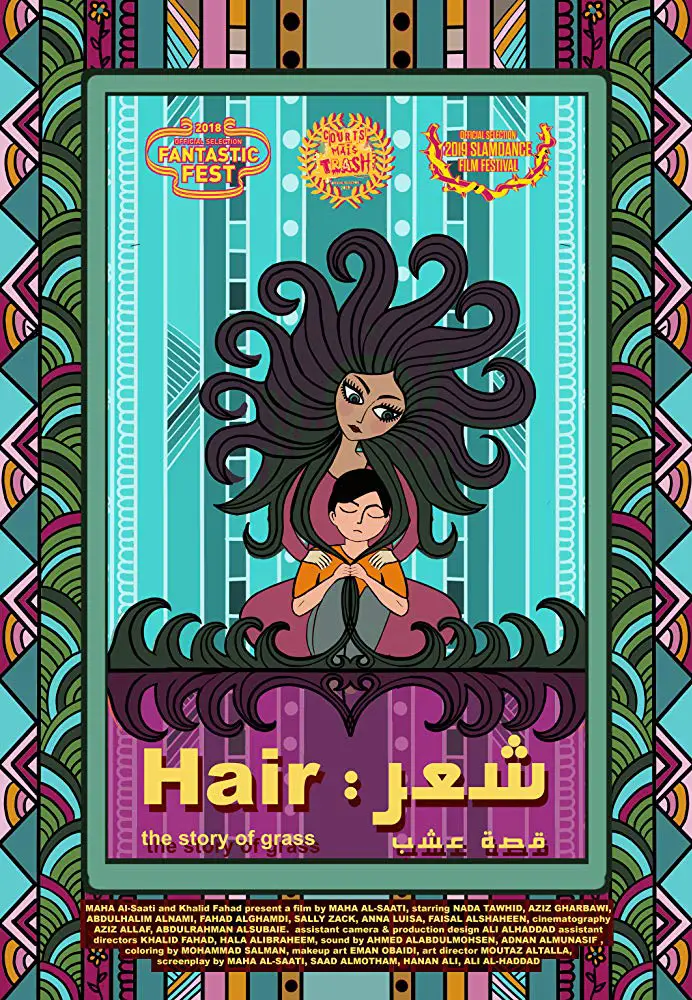
Loosely based on fairy tales and children’s stories, Hair: The Story Of Grass focuses on Norah’s struggles to fit in and a culture’s obsession with hair. Set in the middle east the short opens with Norah in silhouette. Her wild mane of hair dominating her form and eventually the screen. She checks in on her sleeping adoptive brother Yassir, and we are then bombarded by tv images ranging from beauty commercials to cartoons but always coming back to palm trees. Perhaps it’s meant to symbolize her wild shock of hair.
Hair: The Story Of Grass then gives us an image that western women are all too familiar with. Our heroine is in the bathroom alone, trying to get rid of leg hair with painful sticky strips. Her adoptive mother has friends over, and our heroine Norah is forced to wait on them while everyone talks about how she doesn’t dress or act appropriately. But finally, a bright spot in her day. Abu Shanab and his truly spectacular mustache show up. Norah purposefully adjusts her hijab in front of him briefly exposing her hair which, from the context of the piece and Abu Shanab’s reaction, is the cultural equivalent of flashing cleavage. Unfortunately, Yassir, who also appears to have an obsession with hair, notices Abu Shanab’s mustache. Not taken in by it like everyone else, he is convinced the mustache makes Abu Shanab evil. Yassir’s screams would be bad enough, but Abu Shanab notices Norah’s hairy legs and is immediately repulsed.

“…Norah’s struggles to fit in and a culture’s obsession with hair.”
Years pass. Yassir’s body grows, but he still has the mind of a child and an obsession with young girls hair. Norah struggles not only with Abu Shanab’s snubbing but also a constant barrage of unrealistic beauty standards. In this respect Hair: The Story Of Grass is very similar to the work of someone like Spike Lee. Director/writer Maha Al-Saati doesn’t take sides on any issue. She merely presents a story that highlights an aspect of her culture. She isn’t there to tell us how we’re supposed to feel about it. She just wants to highlight this particular aspect.
With a completely non-judgmental eye, Maha Al-Saati navigates a culture struggling with ancient taboos and modern beauty standards. But also, female oppression. And double standards in gender roles. And the treatment of the mentally ill. And consumerism culture. And…a lot of other things. And therein lies one of the problems with Hair: The story of grass. It tries too hard to cover too many subjects. With only 15 minutes, Al-Saati tries to hit on several issues facing not only Arabic culture but the whole world. One can’t help but feel this story might benefit from just a little more focus.
That being said Hair: The Story Of Grass is worth watching. There is a definite sense of whimsy to Al-Saati’s work. She doesn’t seem to want to say either side is right but, instead seems to delight in mocking all sides of the issues in her story. It is a strong first effort from a freshman director, and I hope to see more from her in the near future.

"…struggles with a constant barrage of unrealistic beauty standards..."

[…] review of Hair: The Story of Grass by Enrique Acosta (26 Sep […]